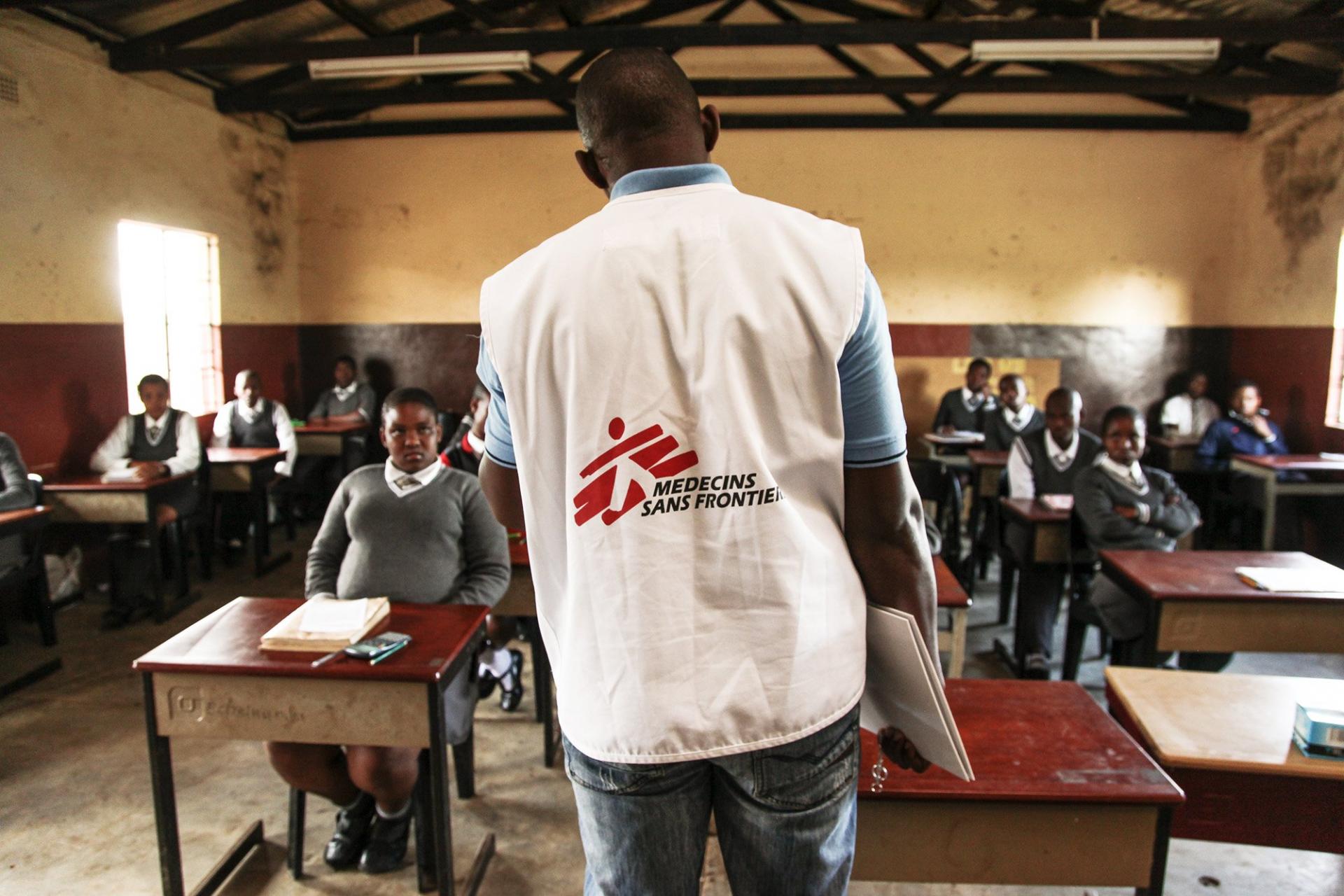KwaZulu-Natal has some of the highest HIV rates in South Africa, a country that hosts the largest HIV patient cohort in the world – over 4 million people on ARVs.
In Eshowe, where 1 in 4 people aged 15–59 years old is HIV positive, MSF is delivering community driven ‘models of care’ to help reduce the rate of HIV and TB infection through prevention, testing, treatment and adherence counselling.
Nurse Slindile Nkambule, who joined MSF this year, after 11 years in the public sector, is part of the team at Eshowe College. She tells us about her work.
Describe a typical day working for MSF at Eshowe College?
Eshowe College has an interesting set-up that enables and encourages HIV testing and treatment. HIV is a big problem here; this is a high transmission area so we find really high numbers of HIV-positive cases.
The truth is that everyone is either infected or affected, so it is important to provide testing and treatment services.
People arrive with any illness or health-related question and they are seen in the room next-door to mine – the first room you see when you walk into the facility.
First, the counsellor there will provide them with information and suggest testing (at the same time, we also have mobilisers working in the college, encouraging young people to get tested).
Next, the counsellor tests anyone who wishes to be tested, before passing anyone who tests positive on to me. I then manage these positive cases and provide people with antiretroviral therapy and care.
In fact, many people don’t arrive at the clinic for HIV testing even though this is a big focus for us here. There is still some stigma in the community and some misconceptions about HIV, so it’s important that we make it easy for young people to know more, to test and access care.
We see roughly 20 patients a day, mostly for STI (sexually transmitted infection) screening, family planning, and HIV treatment but students can come for any minor ailment.
We thought if we only offered HIV testing, they would deny us the chance to even give them information, so this set-up really works for us.
No one is forced to get tested. We provide information to everyone, and then people make a decision about whether they want to be tested or not.
What is it like treating young people for HIV?
I love working with young people. I’ve been working specifically with youths for six or seven years, so I know their tricks - the way they think, their attitude. They tend to think they know better than you...
But nothing much surprises me anymore! I used to think the same way about my parents – no one thinks their parents have been through the same phase of life!
The patients we meet are kids, they are scared – they just need motivation and encouragement to learn about HIV and take the test. Males especially don’t seem to have time for the clinic, so they won’t come in unless they feel sick.
That's why it's important that there are mobilisers in the college, who are a crucial part of our team. Mobilisers encourage the students to get tested, give them education about preventing HIV, and provide free condoms.
Young people know where to get help because the mobilisers tell them.
Working in a college presents its own challenges, though. We are specifically reaching students here, so after three or six months, they may leave as they finish their studies.
If someone is leaving, we write a transfer letter so that they can continue treatment and collect their medication near their homes.
These young peoples’ adherence to treatment is generally very good. We work with lay counsellors who do adherence classes individually with each patient; it helps a lot.
Almost all thet students here have achieved supression of their HIV viral load. I had one patient who came to me after they had stopped taking their ARVs because they found it difficult to take their medicine while living with other people who would see them.
But we welcomed them back and are working with them to stick to their treatment.
What misconceptions do you find people have about HIV?
Most people understand what HIV is; these days there are very few people who are ignorant about it.
However, we do have to correct misconceptions and add more information so they understand it better – some people say they trust their partner because they've been together for a long time and so they have unprotected sex - but they know that their partner hasn't been tested, so it's blind trust.
We have to continue to tell them that trust is not enough: you must imagine everyone to be positive until they test negative, otherwise, you are at risk.
I am hopeful about the future, I think that things are getting better. Now there are children that are born HIV-free, even though they have HIV-positive parents – that brings hope.
With the treatment we are giving, as long as a person's viral load is suppressed, the next generation can be HIV free.
Find out more about MSF's work in South Africa.
